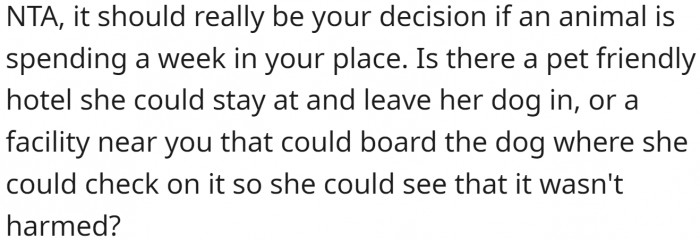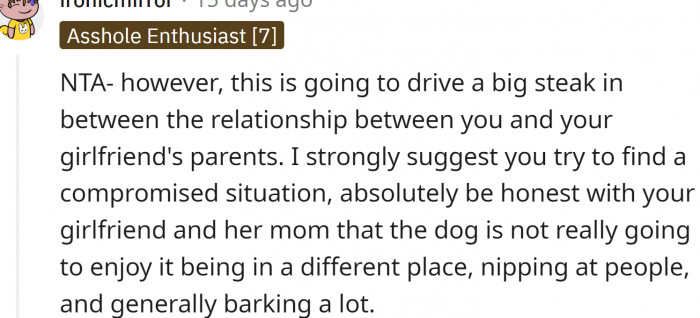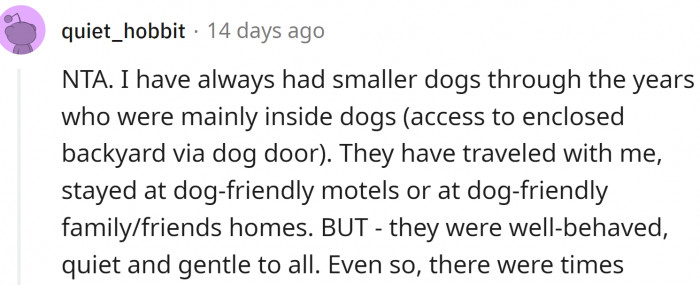Redditor Asks If It’s Wrong For Not Wanting His GF’s Parents To Bring Their Destructive Dog To His Home
There are some people who believe that their pet is the most important thing in the world and that everyone else should accept and love their pet unconditionally. Unfortunately, there are times when these individuals can be quite insensitive and attempt to bring their dogs to other people's houses against their will.
First and foremost, it is important to remember that not everyone loves animals; some people may have allergies or may not feel comfortable around them. In these cases, it is crucial to respect their wishes and not bring a pet into their home.
We have one story that perfectly illustrates this problem. One Redditor asked: "AITA - I won't let my girlfriend's mom bring her dog when she visits for the holidays."
OP lives with his girlfriend, and her parents have decided to visit them for the holidays. They plan to bring their dog. OP has met the dog, and it is a menace.
He doesn't want it in his house. The girlfriend's mom won't even discuss boarding the dog.
GF's dad is on the same page as OP. OP is torn because he knows how much his girlfriend wants to see her parents but doesn't want the dog in his house.
Read this interesting story:
OP asks:

OP lives with his girlfriend, and her parents decided to visit them for the holidays. They plan to bring their dog

OP has met the dog, and it is a menace. He doesn't want it in his house

Understanding the Impact of Pet Behavior on Relationships
Pets can serve as both a source of joy and stress within relationships. Research published in the Journal of Personality and Social Psychology indicates that when a pet's behavior becomes problematic, it can lead to tension between partners. This phenomenon often reflects deeper issues in the relationship, such as differing values or communication styles.
When one partner views a pet differently than the other, it can create friction, leading to feelings of frustration and helplessness. Understanding this dynamic is key to navigating such challenges effectively.
Understanding Relationship Dynamics
Dr. Esther Perel, a renowned couples therapist, emphasizes that "the presence of a pet can often bring underlying relationship dynamics to the surface." She explains that when one partner feels uncomfortable with a pet, it may reflect deeper insecurities or fears about the relationship itself. Furthermore, research highlighted on her professional website indicates that pets can serve as symbols of attachment, complicating the emotional landscape between partners. Understanding these dynamics is crucial for fostering healthy relationships.
The girlfriend's mom won't even discuss boarding the dog. GF's dad is on the same page as OP.

OP is torn because he knows how much his girlfriend wants to see her parents, but he doesn't want the dog in his house

OP has offered the following explanation for why he thinks he might be the asshole:

Additionally, studies suggest that pet ownership can reveal underlying compatibility issues within a relationship. Dr. Terri Orbuch, a relationship researcher and author, states, "Couples often argue about pet care responsibilities, which can highlight deeper unresolved conflicts." Recognizing these patterns can help partners address the root causes of their disagreements. For more insights, visit her professional website at terriorbuch.com.
The tensions surrounding pet ownership often reflect underlying power struggles and differing values between partners.
Studies suggest that differing perspectives on pets can indicate broader incompatibilities in relationship priorities and values.
It's essential to address these differences openly to prevent resentment from building over time.
It should really be OP’s decision

It is a shame:

"This dog has serious behavioral issues."

The Role of Communication in Addressing Pet-Related Conflicts
Open communication is essential for resolving conflicts related to pets. Research indicates that couples who engage in constructive dialogue about their feelings are more likely to reach mutually beneficial solutions. Establishing a safe space for discussing pet-related issues can help partners express their concerns without fear of judgment.
Moreover, utilizing 'I' statements can facilitate healthier conversations. For example, saying 'I feel anxious when the dog behaves destructively' can help the other partner understand the emotional impact without placing blame.
The Role of Pets in Relationships
Pets can significantly impact relationship dynamics, often serving as a source of comfort and joy or, conversely, as a source of conflict.
Research shows that couples who successfully integrate pets into their relationship often report higher levels of satisfaction and commitment.
However, when one partner perceives the pet as a nuisance, it can lead to feelings of neglect and frustration, which may damage the relationship.
Find a compromise, talk honestly ...

Empty-nesters, or people whose children have grown up and left home, often find themselves with a lot of extra time on their hands. To fill this void, many turn to their pets for companionship.
Pets can provide comfort and joy, but some empty-nesters can become overly attached to their animals. For some, pets become a substitute for the children that have left home.
This can lead to empty-nesters treating their pets like children and providing them with more attention and resources than necessary. They may also become overly protective of their pets and view them as a source of emotional support.
Compromise here will go a long way

One Redditor asked

Therapeutic interventions can also be beneficial in navigating these discussions. Couples therapy often focuses on improving communication skills and addressing underlying relational issues. This approach can help partners develop a shared understanding of pet care responsibilities, leading to a more harmonious living environment.
To navigate this conflict, couples should engage in open and honest conversations about their feelings toward the pet and the implications for their relationship.
Studies highlight that effective communication is key to resolving conflicts and fostering understanding, which can ultimately strengthen the relationship.
Setting boundaries regarding the pet's presence in shared spaces can also help alleviate tensions.
This Redditor shared their experience:

There are times when it is simply not appropriate to bring a dog

So true:

Practical Strategies for Managing Pet Behavior
To manage a pet's destructive behavior, implementing training and behavioral modification techniques is essential. According to Dr. Ian Dunbar, a renowned animal behaviorist, "Consistency and positive reinforcement are key to effective dog training." Establishing clear boundaries and providing rewards for desired behaviors can lead to more effective training outcomes. Moreover, seeking professional help from a dog trainer or behaviorist can offer additional support. As Dr. Terri Orbuch, a relationship expert, suggests, "Investing in professional guidance can alleviate stress for both partners, creating a more peaceful home environment."
Practical Steps to Resolve Conflicts
Encouraging couples to establish a clear understanding of each other's boundaries regarding pets can help mitigate conflict.
Research supports that setting specific boundaries can enhance relationship satisfaction by ensuring both partners feel heard and respected.
Additionally, couples might consider seeking counseling to explore these dynamics further, allowing for a neutral space to address grievances.
Smart thinking here:

They could, but would they...

Some people may have a pet-free home for various reasons, including medical, health, or even religious reasons. In these cases, it is even more important to respect the homeowner's wishes and not attempt to bring a pet into their home.
Finally, even if the homeowner has no objections to pets, it is still essential to be considerate and ask for permission before bringing a pet into their home.
People should never try to force their pets onto someone else and should be aware that some individuals may not be comfortable with pets, even if they are allowed in their homes.
Psychological Analysis
This situation exemplifies the intricate dynamics that pets can introduce into a relationship. When one partner feels overwhelmed by the presence of a pet, it can indicate deeper issues related to attachment and prioritization within the partnership. Encouraging open dialogue about these feelings is crucial for maintaining a healthy relationship.
Analysis generated by AI
Analysis & Alternative Approaches
In summary, navigating the complexities of pet ownership in relationships requires open communication and mutual respect.
By addressing underlying insecurities and establishing clear boundaries, couples can foster a more harmonious environment.
As research suggests, effective communication is paramount in ensuring both partners feel valued and understood, ultimately leading to a stronger relationship.
Analysis & Alternative Approaches
In summary, addressing pet-related conflicts requires a combination of communication and practical strategies. Research supports the idea that understanding each other's perspectives is crucial for resolving disagreements. By working together, partners can create a more supportive environment for both their relationship and their pet.



